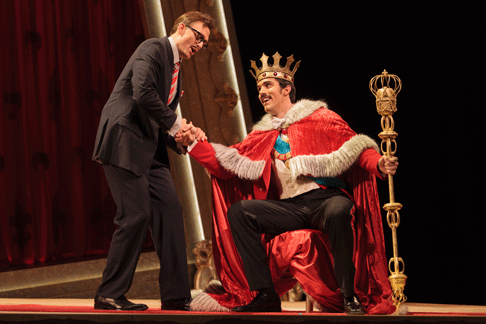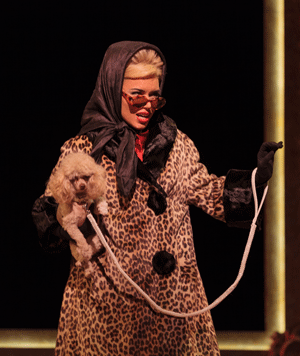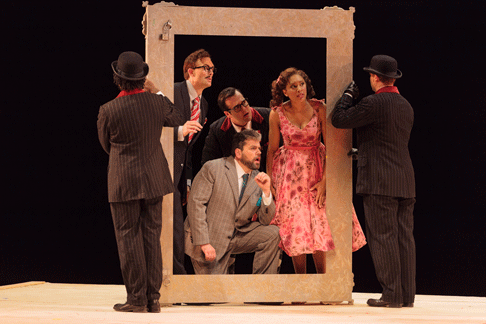
23 Jul 2013
Glimmerglass’s rarely done ‘King for a Day’ a rare treat, well done
This zany production of Verdi’s only comic opera before ‘Falstaff’ keeps the singers in chaos and the audience in stitches
English Touring Opera are delighted to announce a season of lyric monodramas to tour nationally from October to December. The season features music for solo singer and piano by Argento, Britten, Tippett and Shostakovich with a bold and inventive approach to making opera during social distancing.
This tenth of ten Live from London concerts was in fact a recorded live performance from California. It was no less enjoyable for that, and it was also uplifting to learn that this wasn’t in fact the ‘last’ LfL event that we will be able to enjoy, courtesy of VOCES8 and their fellow vocal ensembles (more below …).
Ever since Wigmore Hall announced their superb series of autumn concerts, all streamed live and available free of charge, I’d been looking forward to this song recital by Ian Bostridge and Imogen Cooper.
Although Stile Antico’s programme article for their Live from London recital introduced their selection from the many treasures of the English Renaissance in the context of the theological debates and upheavals of the Tudor and Elizabethan years, their performance was more evocative of private chamber music than of public liturgy.
Evidently, face masks don’t stifle appreciative “Bravo!”s. And, reducing audience numbers doesn’t lower the volume of such acclamations. For, the audience at Wigmore Hall gave soprano Elizabeth Llewellyn and pianist Simon Lepper a greatly deserved warm reception and hearty response following this lunchtime recital of late-Romantic song.
For this week’s Live from London vocal recital we moved from the home of VOCES8, St Anne and St Agnes in the City of London, to Kings Place, where The Sixteen - who have been associate artists at the venue for some time - presented a programme of music and words bound together by the theme of ‘reflection’.
'Such is your divine Disposation that both you excellently understand, and royally entertaine the Exercise of Musicke.’
‘And there was war in heaven: Michael and his angels fought against the dragon; and the dragon fought and his angels, And prevailed not; neither was their place found any more in heaven … that old serpent … Satan, which deceiveth the whole world: he was cast out into the earth, and his angels were cast out with him.’
There was never any doubt that the fifth of the twelve Met Stars Live in Concert broadcasts was going to be a palpably intense and vivid event, as well as a musically stunning and theatrically enervating experience.
‘Love’ was the theme for this Live from London performance by Apollo5. Given the complexity and diversity of that human emotion, and Apollo5’s reputation for versatility and diverse repertoire, ranging from Renaissance choral music to jazz, from contemporary classical works to popular song, it was no surprise that their programme spanned 500 years and several musical styles.
The Academy of St Martin in the Fields have titled their autumn series of eight concerts - which are taking place at 5pm and 7.30pm on two Saturdays each month at their home venue in Trafalgar Square, and being filmed for streaming the following Thursday - ‘re:connect’.
The London Symphony Orchestra opened their Autumn 2020 season with a homage to Oliver Knussen, who died at the age of 66 in July 2018. The programme traced a national musical lineage through the twentieth century, from Britten to Knussen, on to Mark-Anthony Turnage, and entwining the LSO and Rattle too.
With the Live from London digital vocal festival entering the second half of the series, the festival’s host, VOCES8, returned to their home at St Annes and St Agnes in the City of London to present a sequence of ‘Choral Dances’ - vocal music inspired by dance, embracing diverse genres from the Renaissance madrigal to swing jazz.
Just a few unison string wriggles from the opening of Mozart’s overture to Le nozze di Figaro are enough to make any opera-lover perch on the edge of their seat, in excited anticipation of the drama in music to come, so there could be no other curtain-raiser for this Gala Concert at the Royal Opera House, the latest instalment from ‘their House’ to ‘our houses’.
"Before the ending of the day, creator of all things, we pray that, with your accustomed mercy, you may watch over us."
The doors at The Metropolitan Opera will not open to live audiences until 2021 at the earliest, and the likelihood of normal operatic life resuming in cities around the world looks but a distant dream at present. But, while we may not be invited from our homes into the opera house for some time yet, with its free daily screenings of past productions and its pay-per-view Met Stars Live in Concert series, the Met continues to bring opera into our homes.
Music-making at this year’s Grange Festival Opera may have fallen silent in June and July, but the country house and extensive grounds of The Grange provided an ideal setting for a weekend of twelve specially conceived ‘promenade’ performances encompassing music and dance.
There’s a “slide of harmony” and “all the bones leave your body at that moment and you collapse to the floor, it’s so extraordinary.”
“Music for a while, shall all your cares beguile.”
The hum of bees rising from myriad scented blooms; gentle strains of birdsong; the cheerful chatter of picnickers beside a still lake; decorous thwacks of leather on willow; song and music floating through the warm evening air.

This zany production of Verdi’s only comic opera before ‘Falstaff’ keeps the singers in chaos and the audience in stitches
The heroes of the Glimmerglass production of Verdi’s rare — really rare — second opera, Un Giorno di Regno (King for a Day), are director Christian Rath, choreographer Eric Sean Fogel, and set and costume designer Court Watson. This trio has taken a work with a threadbare, unfunny plot, and only intermittingly inspired music, and transformed it into an afternoon of zaniness that delighted the audience in the Alice Busch Opera Theater in Cooperstown.
Verdi wrote this work in 1840 when he was 27. It is his only comic opera until Falstaff, the final masterwork of his old age. Un Giorno was booed by the audience in Milan, in part because of poor singing, and it received but a single performance.
Verdi bounced back from this disappointment with his third opera, Nabucco, which is about as far in spirit from Un Giorno as one could get. He was clearly not looking in the rear-view mirror. Just as he abandoned the comic path, so has the work been abandoned by opera houses in the last 173 years, although Europe has seen a few mountings.
The Rath team put the six principal singers and the chorus through all sorts of physical activity — climbing, jumping, boxing, kissing, dancing, and swinging chairs at each other in a chaotic closing scene to Act 1 that is reminiscent of The Barber of Seville and The Italian Girl in Algiers, both by Rossini, whose presence hovers over Verdi in this creation. The site gags come so thick and fast and are so ingenious that the audience forgets this soufflé could collapse at any minute if the temperature is not kept at a high heat.
 Ginger Costa-Jackson as Marchesa
Ginger Costa-Jackson as Marchesa
Rath signaled to the audience that a circus was about to start by projecting clown-costume circles of color on a white curtain during the toe-tapping overture. Then, in the English titling (for a production sung in English), the audience was invited to attend a double wedding and to allow four hours “to clear security.” Similar 21st century touches were interpolated in the text by Kelley Rourke, who did all she could to make this creaky story of young love thwarted (and then triumphant) relevant.
The stage business was so intricate, and non-stop, it was a wonder that the first performance went so smoothly. I expected the cast to fall off the steeply raked set at any moment and tumble into the orchestra pit, but no one did. Indeed, if anyone was ever out of place it wasn’t evident to the audience. The physical comedy delivered by the young cast assured a success.
Had Verdi not been the one to write this, however, no one would stage it today. So, is the great master present at all in the music? Here and there, yes. A few phrases from mezzo-soprano Ginger Costa-Jackson (as the Marchesa) find their way into Gilda’s music in Act 1 of Rigoletto. Some of the choral work prefigures Ernani.
What is more instructive, however, is how Verdi assimilated Rossini, Donizetti and Bellini in this work, which is only to be expected given how wet behind the ears he was. The basso buffo singing of Doctor Dulcamara (The Elixir of Love) and Don Pasqualeare not far from the surface in the music for bass Jason Hardy as the Baron Kelbar, and baritones Andrew Wilkowske (as La Rocca) and Young Artist Alex Lawrence as the King of the title. One extended passage for the King and chorus in Act 1 is a close parallel to music from Rossini’s Il Viaggio a Reims. A promising duet for tenor and baritone in Act 1 could be plopped into Bellini’s I Puritani without much alteration.
And so it goes for about two hours of music — little Verdi, but lots of early 19th century Italian opera by other masters. What he did demonstrate at 27 was his ability to write for the voice. The tenor part (the love-sick Edoardo, sung by Young Artist Patrick O’Halloran) is particularly fine.
As the Marchesa, Costa-Jackson was the only “name” singer in the cast. Dolled up in a red sheath and a blond beehive wig, she vamped around the stage, often holding a twinkly gray toy poodle that adamantly refused to move at one point in the first act. Her part lies high for a mezzo, and Costa-Jackson had some problems at the top of the range. But given she was in a track meet of a production that must have sorely taxed her lung power, it’s surprising she sang as well as she did.
 Clockwise from top: Jason Hardy as Baron Kelbar, Patrick O'Halloran as Edoardo, Jacqueline Echols as Giulietta and Andrew Wilkowske as La Rocca
Clockwise from top: Jason Hardy as Baron Kelbar, Patrick O'Halloran as Edoardo, Jacqueline Echols as Giulietta and Andrew Wilkowske as La Rocca
None of the three low-lying males — Hardy, Lawrence, and Wilkowske — has the cavernous bass or baritone voice, or the agility in articulation, to do justice to the patter. Nor do they have the blustering style of a Doctor Bartolo. All were too light for their roles, but they threw themselves into the proceedings with gusto, particularly Hardy. His impersonation of a boxer alone is worth the price of admission.
The best singing came from the young couple (who would become Nannetta and Fenton in Falstaff in another 53 years). Young Artist Jacqueline Echols was a prim Giuletta in her modest patterned dress. She has a melting soprano voice and terrific stage presence, even when singing from under the raked stage. As her true love Edoardo, O’Halloran looked like Clark Kent in an argyle sweater, matching socks, shorts and black-frame glasses. He doesn’t yet sing like Superman, but he has much potential. His voice seems agile enough for Rossini, but also with sufficient heft for Donizetti and Bellini. For me he was the most rewarding singer on stage.
The two smaller parts of Delmonte and Count Ivrea (who totters around on a walker) were assumed by two more Young Artists, Andrew Penning and Joe Shadday.
The performance was conducted by Joseph Colaneri, the new music director of the Festival. He miraculously led a crisp, tidy performance in which everyone stayed together even as they were rocketing around the stage. I don’t know how this was achieved, but it was. The orchestra played very well for its new boss.
Un Giorno can be heard on CD in a luxury cast that includes José Carreras, Jessye Norman, Fiorenza Cossotto and Ingvar Wixell on Decca, under conductor Lamberto Gardelli. The score holds up in repeated listening, particularly with the manic images from Glimmerglass in one’s head. Even though Rath’s production book must be 5,000 pages long, other companies might want to take a look at this rarity — if the cast is young and fit.
David Rubin
This review first appeared at CNY Café Momus. It is reprinted with the permission of the author.